Pine Mountain Settlement School
Series 09: Biography – Staff/Personnel
Series 12: Land Use
Series 31: Religion
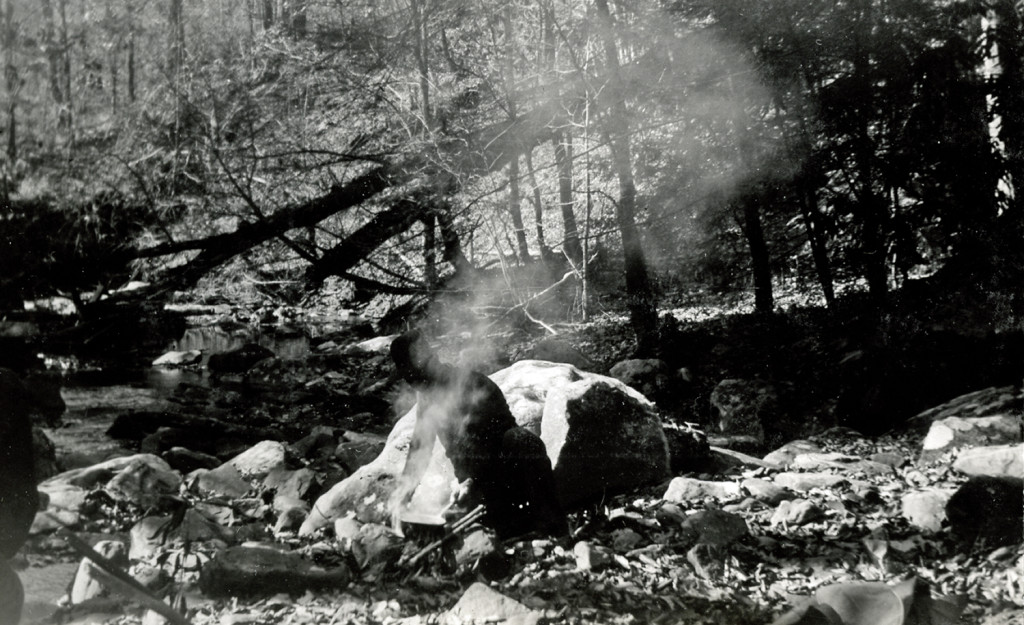
Mr. Creech [Henry Creech?] making coffee – Gabes Branch outing. 1940s [nace_1_027c.jpg]
ALICE COBB STORIES Logging in Gabes Branch and Holiness Service
TAGS: ALICE COBB STORIES Logging in Gabes Branch and Holiness Service; Alice Cobb; logging; religion; Holiness church; Gabes Branch; Chloa Smith; Chloa Smith Bunch; Sunday School; Jim Faulkner; Alec Day; Alonzo Turner; Grub Bailey; Mrs. Hensley; Estel Hensley; Harry Day; Kenneth Browning; John Shell; Columbus Couch; Alice Boggs; Herman Bailey; Bish Boggs; Dorse Wilder; Lige Turner; Flory Bailey; Becky Boggs; Gladys Hill;
“One does not act rightly toward one’s fellows if one does not know how to act rightly toward the earth.” L.H. Bailey, The Holy Earth, 1915.
Alice Cobb seems to move easily between solitude and a hunger for human communication. This long ramble takes in her joy of walking in a forest that is recovering from logging, visits with community families and a visit to a local Holiness church. Her experience, Thoreau-like, reminds us of our many levels of existence and beliefs:
“There is nothing so sanative, so poetic, as a walk in the woods and fields even now, when I meet none abroad for pleasure. In the street and in society I am almost invariably cheap and dissipated, my life is unspeakably mean. No amount of gold or respectability would in the least redeem it, — dining with the Governor or a member of Congress!! But alone in distant woods or fields, I come to myself, I once more feel myself grandly related, and that cold and solitude are friends of mine. I suppose that this value, in my case, is equivalent to what others get by churchgoing and prayer. I thus dispose of the superfluous and see things as they are, grand and beautiful.”
TRANSCRIPTION: ALICE COBB STORIES Logging in Gabes Branch and Holiness Service
LOGGING IN GABES BRANCH AND HOLINESS SERVICE
MARCH 21, 1937
I had arranged with Chloe [Chloe Smith — kitchen staff] to have my lunch packed for Sunday, with the idea that it might take quite a long time to get all the way down Divide way to announce the opening of Sunday School after the midwinter pause. So the next morning when I found that Jim Faulkner was driving over the mountain I went with him as far as the Divide, where my trek would start.
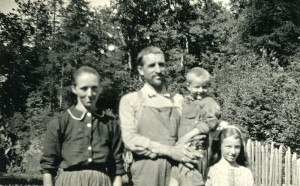
Frances Lavender Album. “My friend Alec Day and family. There are 2 younger children.” [lave041.jpg]
They [the loggers] had done their work only too thoroughly, and what was once a most beautiful and secluded forest was now millions of stumps. But it was secluded enough, and the undergrowth of mosses and lichens was still very lovely. I was soon out of sight and hearing, even off the old road which is off the highway anyway, and so very much alone amid those stumps and grim rocks that I felt almost frightened. It seemed like a graveyard. The real forest, where the trees crowd around close and companionable, isn’t half so desolate as the ruins which ruthless men have left behind with their axes and saws. All up that lovely hill ahead of me, just torn and broken stumps, molding chips and knots, and moss trying valiantly to cover it all as quickly as possible. Eventually of course, out of those broken and dying things there will come living growths as beautiful, although so small and intricate, as the forest trees themselves. I felt that as I broke off lovely lacy lichens, moss in most delicate formations — little whiskered mosses, diminutive green cups (we call them fairy drinking cups, and sometimes they are red at the bottom where there is wine left over from the fairy banquet the night before.) Some of the moss is tipped with tiny scarlet globules, and I understand from our science teacher that this is in the process of reproduction. I watched common pillow moss turning (before my mind) to the rare reindeer moss, which is almost like a fern and resembles reindeer antlers. I found other moss on which the tips were the most delicate pink, probably in the same stage as the red, but growing out of different soil. It was all so wonderful, and every tiny thing, even down to where my human eyes could no longer see, was perfectly, exquisitely fashioned.
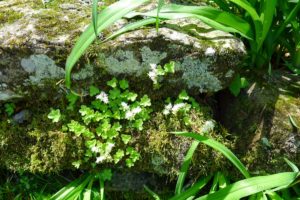
April showers brought May flowers. Photo by HHW. [P1130825.jpg]
I pluck you out of the crannies,
I hold you here, root and all, in my hand,
Little flower—but if I could understand
What you are, root and all, and all in all,
I should know what God and man is.
— Alfred, Lord Tennyson, 1863]
I think of Tennyson’s flower in the crannied wall, and think that if I could understand just one tiny particle of moss, from beginning to end, I could know the whole secret of man and God and earth and heaven, things present and to come. And then again I am so content just to enjoy them, to feel the thrill of their beauty and to not even try to understand what they are and why. But there is a beautiful mystery — why and how these ever-varied, and ever-lovely and delicate and perfect formations grow deep and hidden away, in the darkest corner of a rotten tree stump, and the rarest flora, the orchids which will not bear the light and air of a million dollar conservatory, will bloom and be beautiful for no apparent use at all, in the loneliest, darkest, swampiest heading up of a mountain creek. Well, it says something I guess, that perfection is perfection regardless of whether or not any human eye will see it. It’s there, and it’s perfect and it is beautiful, and its just being has meaning, I guess.
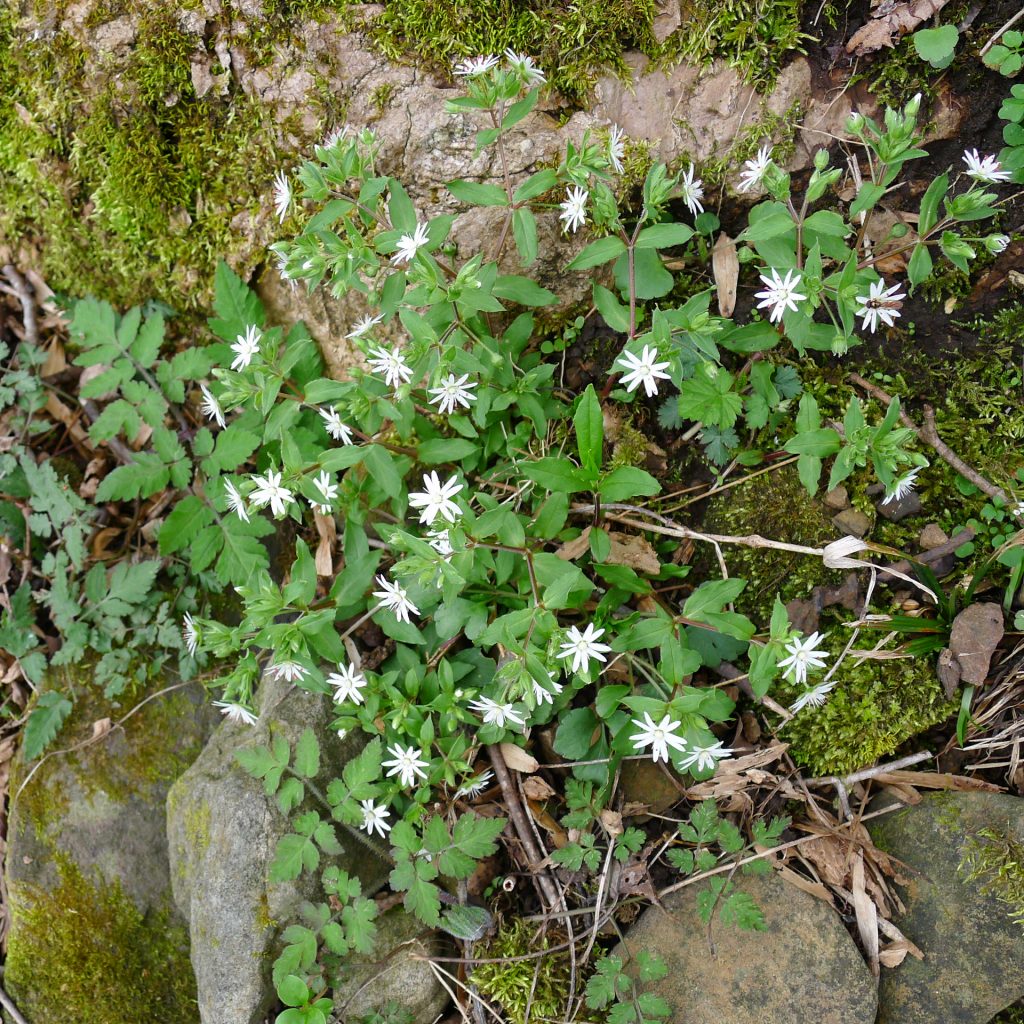
Moss and Salt and Pepper in rocks in Spring forest. HHW
It was a misty day, a little chilly and therefore exactly right for hiking up a hill, and as I walked along the side, and looked down into the valley below, and on up through the overhanging mists to the top above, I had the most wonderful sensation of all-ness …. I wished then that I could express it. I am farther from it now. But it seemed for that moment that in that brief time, and in that spot, was everything of meaning and value in the whole world, in all time. Outside of the facts of life, consciousness, solitude, matchless beauty growing out of devastation and death, wounds and healing, sickness and cure, rapture and apathy, cruelty and compassion carelessness and care, ignorance, knowledge, deep love and a need for thinking and knowing more, heaven above and earth below, heaven blessing earth receiving, growing, reproducing, accepting and battling against inexorable forces — outside this, it seemed to me there was nothing, nothing in the world that could be said or done, that mattered. It made every trivial everyday difficulty, disagreement, misfortune seem so unworth worry.
I looked at my watch about this time and realized it was just about church time and it was a lovely Palm Sunday time there quite alone, with the hills and clouds and the valley faintly showing through them a long way off.
By this time, too, my basket was getting full of pretties, and I needed the room the sandwiches were taking, so I walked along eating them, an thinking. Suddenly for some reason, I glanced up and there about four feet from me was big tall Harry Day, looking down. It was startling, for he had appeared out of nothing at all, silently as a cat. I said hello and asked about the folks, and he went on while I kept eating my sandwich. It was rather uncanny. By this time, I decided that I wouldn’t deliberately hunt the Day’s house, but if I happened on them I would stop and would give the banana and the boiled egg in my basket to the first child who appeared. So I kept following different trails here and here until instead of the Day’s place I found myself back on the highway, two miles behind the place where I had started, and with all that distance to retrace. And my egg had broken. I disposed of it, and hurried on up to the Hensley house, to call on Mrs. H. [Hensley] who is always glad to see me.
They [the Hensleys] live in the most exposed little house in all that region, I guess. It is just a step or two from the district schoolhouse where we have Sunday School.The Hensley house is on stilts and has some crazy broken steps going up to it. They are more broken every time I go, and this time there was one gone. The house has two rooms, and in the room next to the one where I sat, I could see through the door that someone was in bed. There seemed to be several beds in there, and one in the room where I was sitting.
It was really quite clean and neat, and I thought perhaps she had been expecting me since I had sent word down the creek that I would probably be along. There was a cheerful little fire in the fireplace, and I’d have been quite comfortable except for thinking how cold it must be in severe weather, with those wide chinks in the floor, so that one could hardly put a chair down without one leg poking through a crack. And the daylight came up through there, and through the chinks in the walls, too.
There was a framed cradle roll Sunday School certificate on the wall, and I asked Mrs. Hensley if she had got that at Pine Mountain. She said no, it had come from Laurel County, where she and her husband [Big John Hensley] lived for nineteen years.
“They was hard years,” she said. She speaks very slowly, and wearily, as though the next word may not come out. “When a body is as old as I am — sixty-one come April — they can’t get around and do the way they used to.”
I said I thought sixty-one wasn’t old, especially when you thought of old Uncle John Shell who lived to be 130 [not entirely true, see John Shell, Oldest Man in the World], and Aunt Louise [Louize] going strong at 106 [almost true].
“No, but when a body’s worked hard as I have, and been sick so much, they feel their years!” she said. “Them was hard years in Laurel County. My husband was paralyzed so he couldn’t move his legs for seven years, and in all that time me and the two children had to make the crop, and keep alive someway! We didn’t have ary cent of money. Just lived off the land. I raised sheep and spun the wool for clothes, and we had a cow. We got along, but it was hard.”
“Just you and the two children,” I marveled.
“Yes, just us three,” she said. “But we could do more there where there weren’t no hills, than six men could do here in this mountain country. But my husband he says it’s healthy here. He come back to the mountains to get his health, and I reckon he got it. He can walk and move his legs all right now!”
We talked a little more about old times, but I have never quite persuaded Mrs. Hensley to tell me about her children, and about Estel, the hunchback boy who lives with her, and is her grandson. I understand that he is not a legitimate child, but she has always been quite silent about her children. Whether she thinks I wouldn’t be interested, or doesn’t want to talk about it I don’t know. But every time I stop there she seems more talkative and friendly, so perhaps I’ll know more about her life sometime. It must have been a hard one. She calls Estel “that little cripple feller,” just as if he were a neighbor. He hadn’t been well so I left the banana for him instead of the Day children, and went on down the road.
The next place I came to was the house. There was no one at home, and things didn’t look too bad around the house. Of course, it’s a poorly built house and the yard was pretty cluttered up, but Palm Sunday seemed to have lent a sort of dignity to everything. It seemed very quiet and peaceful.
From Grub’s house, I went on down to see his daughter Maud [Bailey], who is married to Howard and lives in a small place just below Grub’s. There are seven boys and four girls in the Bailey family, some of them quite intelligent, some the opposite, and one, Elmer [Bailey], had just returned to the school after a variety of nervous breakdowns which has touched his mind a little. We are not quite sure whether he is in a normal mental state now or not. Maud has six children in stairsteps beginning with age six or seven. Maud, herself, can’t be barely as old as I am and they [the children] were all crowded about her skirts, waiting for her to wash them. She apologized for their unwashedness, got her pan of water and soap and began to take them in turn while I sat there. There was a good deal of fuss because baby Junior didn’t want to be washed and seemed surprised and hurt at the idea. Maud put on quite an air, I thought, and [she] requested Miller (the five-year-old) to “bring mother the diaper from the chifferobe, please.” She retired to another corner of the room to put the diaper on Junior and then discovered she didn’t have a safety pin so Miller and Raymond and Sara Jane and Walter and Paul and the puppy and I all scrambled around trying to find a safety pin. I had just located one in my jacket pocket when somebody found a good big brassy one sticking in the wall behind the stove. It was papered with newspapers there, and this vast [lost?] safety pin was stabbing out the eye of some gentleman of current importance appearing in that particular issue of the Enterprise [Harlan Daily Enterprise].
Well, we got Junior’s diaper adjusted finally, and then I left amidst warm invitations to come back just any time. And stay the night.
I met Columbus Couch coming up the main road when I got started again, so that saved a trip over on the Branch. He and his little brother are my two faithfuls [in Sunday School]. As Mrs. Hensley said, “Columbus is a terrible feller for Sunday School!” I didn’t stop at Creeches or Wilders or Williamses since Maud had told me there was a meeting at the Church of God, and there probably wouldn’t be any of the Holiness folks at home.
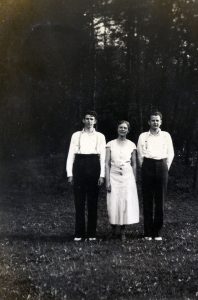
10_2462 Alonzo Turner, Abbie Winnie Christensen, Ben Turner. [098_IX_students_10_2462_001.jpg]
As I went up the hill to the church house — a one-room shingle house with a big white sign “The Church of God,” I heard a good deal of noise and could hear dancing and singing going on. I hesitated just a second at the door, thinking it might be the wrong thing for a lone woman to go walking in, and by that time the singing had stopped but the preaching was going on at a great rate, assisted by Amens and Hallelujas from the audience. But I decided I was outside the pale anyway, so opened the door and walked in. Even the preacher stopped and the whole crowd turned around to look. But I went over in a corner and sat down on a wooden bench, there making myself as inconspicuous as possible, and pretty soon they got started again. Kenneth Browning was preaching. He had a smile that seems to express his perfect joy and ecstasy and a sort of rapture — it’s hard to describe it. He didn’t lose much time in turning the sermon in my direction and holding up to scorn those people that kept their religion back in a corner and wouldn’t come out and testify in public, etc. The Holiness people don’t trust me because my little Sunday School seems to have been a sort of rival of their church — or they feel that way about it. The prominent Holiness people keep their children at home and there has been some pulling against us, which has never bothered me much.
So, well, there they were — Kenneth walking back and forth across the front of the room, shouting and whooping and dancing some and hitting the tambourine a resounding thump every once in a while (they use a tambourine like a drum, to keep time to the songs with) and behind him were the Saints. I thought Saints, my eye. There was JB whose wife I saw baptised in the creek at Big Laurel and soon after that she was taken to London jailhouse for writing money orders to herself in the post office (she was postmistress) and J himself was telling all up and down the creek that he was going to put a stick of dynamite under Alice Boggs‘s house and blow her up, and then was going to shoot Alice and scatter her arms and legs across the railroad track so folks would think the train did it. And so on. Well John was there trying to look pious, and B was there looking very pious, and BS getting the jerks and whooping and Amening whenever there was an opening, and several others — DW preaching about the people who went to card parties (this also meant for me and the other Pine Mountain folks who presently came in with Alonzo) and his own daughter sitting up front with a permanent wave and rouge and lipstick and whatnot.
Over the row of Saints, there was hanging along the wall a row of hats of different stages of dilapidation. There was one woman’s bonnet which perhaps belonged to B. She takes her place with the Saints when the row isn’t filled up with men. And over the row of hats hung three green cardboards with white mottos in big letters. I forget the sentiments on the motto cards, but they are the familiar ones that appear on the wall of every house where there is a bootlegger or other lawbreaker living, seems to me — “As for me and my family, we worship the Lord” etc. There was a lamp on the table, but the preacher carefully hung it on the wall when they were getting ready to sing, evidently fearing it might be broken in the excitement. There was another lamp suspended from the ceiling just above the stove, which was in the middle of the room. Occasionally, one or another of the Saints would leave their high place and come down to put a piece of wood in the fire and poke it up.
In the front row of benches and in back of them almost to my far corner, were the women and children, and in the farthest corner, back by the door, are the people of no faith, the scoffers, and those who dropped in because they had nothing else to do and liked the entertainment. Harry Day shambled in shortly after I came and I wondered where he had been since I met him in the woods. Herman Bailey, the brother, was there, and Big John Hensley, who had been in bed when I called on Mrs. Hensley. John and Herman are in my Sunday School, but they aren’t any more devoted to one organization than another, and just take them all in, getting in on anything that happens to be given away free.
I hadn’t been there very long until Alonzo came in with Gladys Hill and a gentleman visiting us from Berea, so I felt a little better fortified to stand the stream of abuse which was presently hurled at me by the various preachers as they took turns about.
Kenneth Browning said, “There’s them that thinks hit’s all right to dance. When they go by a dance hall and hear the shoutin’ and dancin’ in thar and they thinks, why that’s all right, that’s perfectly all right, praise his name, to holler for the devil, Glory to God, but they just cain’t stand to hear nobody hollerin’ for the Lord praise his holy name.” He held up the Bible. “Do you know what this is? Hit’s the Discerner. If you can’t tell which man is right and which one is wrong, all you got to do is turn to this here Discerner and thar hit is right thar! Hit’ll discern everything!”
The preachers have a way of seizing the Bible as if they were going to throw it out in the crowd, and they hold it up high and open it at random and read out loud just any verse they happen to see and preach about that. After Kenneth sat down and we had a song, which didn’t bring any good results as it came just after the arrival of the Pine Mountain folks, the second preacher young B Boggs got up, and he grabbed open the Bible and began to read the passage, evidently from Revelations, “The snake rose out of the pit …” etc., etc. and sp!omething “…was hidden by reason of the smoke — glory to God.” B kept interspersing a “hup” in front of every sentence, a sort of hiccup, to give emphasis. “(Hup!) If you study about them old scorpions comin’ up out of that pit to torment them (Hup!) as don’t have the seal in their foreheads (Hup!) — they are a goin’ to torment those glory to God that ain’t got glory to God holiness. (Hup!) O, if we can just be able to escape them plagues that God’s going to send —” long sigh — “Us folks that works in the mines, glory to God — hits a sight how timber and rocks keep coming (Hup!) crashin’ our lives and we keep a studyin’ about death. Folks, they is going to be a terrible end for folks that ain’t got the seal in their foreheads! Glory to God! Saint Paul was a Pharisee. He was an educated man. He was a Pharisee to the bottom he was — Glory to God…. and when he got saved he was just as honest about it! (Hup!) All we got to do is to ask and if we don’t ask we will never get nothing … Seems like the night the Lord struck me I was so restless, and the Lord just hit me with a great power and I went into the church house the next day and everybody looked just like they was angels…”
And so on. B was more successful in his preaching than Kenneth so when they began to sing and play the tambourine there was a good deal more spirit. Bradley S got up and danced and jumped over the pulpit, and then Lige T got the spirit and he danced and couldn’t even stop when the music stopped but just danced right on, speaking in tongues and seeming to be transported. Kenneth’s wife and another woman, who, they said had got the spirit the night before, both danced too. (When they talked to me about dancing I thought it was entirely out of place because I couldn’t begin to dance as well as they do. But the Holiness folks are very much against the English Country folk dancing which our children like so much.)
Dorse Wilder came next with his speech about card parties — I guess they think we play cards at Pine Mountain. And I haven’t seen a card for six months.
During all this time, as usual, the audience had been coming and going and Redie Nolan and I had had quite a good talk about Sunday School next Sunday — we’re going to dye Easter eggs on Saturday, to hide for the children. Also, several others had come around to talk to me. They all seem thrilled that Sunday School is beginning again. and the little Bailey girl (one of twelve children) Flory, was sitting there telling me all the current gossip. I told her about the next Sunday, and that she should come at two o’clock. She said, “We hain’t got ary clock. But Maud has. I’ll go ask her!” she is a bright looking child and so attractive with a tooth out and freckles on her nose.
By this time we were getting a little weary of the dancing and singing and preaching so we left just after Becky Boggs had got through whipping all her children right outside and bringing them back in to sit with her on the front row.
I was glad for the ride home, since I had so many woods pretties, that my basket was heavy.
Dorse Wilder said he had the tobacco worm before he got saved — couldn’t take tobacco out of his nature — either smoking or chewing, one or t’other, excepting to eat, until he got the holy spirit.
Back to ALICE COBB GUIDE TO WRITINGS, STORIES & LETTER COPIES
See Also ALICE COBB Biography

